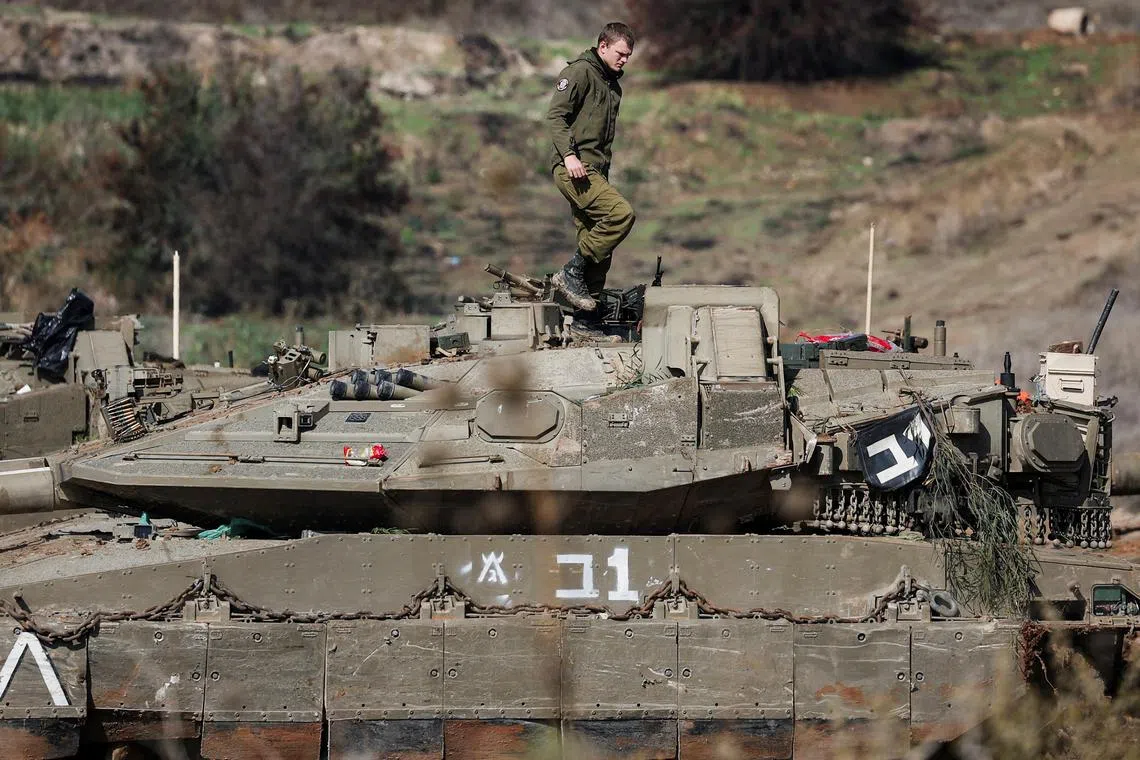Israel, Hezbollah trade accusations of ceasefire violations; civilians caught in the crossfire
Sign up now: Get ST's newsletters delivered to your inbox

An Israeli soldier stands on a tank near a road leading to the Israel-Lebanon border.
PHOTO: REUTERS
Follow topic:
BEIRUT – Israel and the militant group Hezbollah on Nov 28 traded accusations of violating the terms of a ceasefire deal that paused over a year of fighting between them, as civilians returning to their towns and villages straddling the Israeli-Lebanese border came under fire.
Israel claimed the truce was breached after “several suspects” arrived at a supposedly conflict-free zone.
But Hezbollah said Israel was the one that violated the conditions of the ceasefire deal when its tanks fired at six areas in southern Lebanon.
“The Israeli enemy is attacking those returning to the border villages,” Member of Parliament and Hezbollah member Hassan Fadlallah told reporters after a Parliament session.
“There are violations today by Israel, even in this form,” he said.
A ceasefire between Israel and Hezbollah took effect on Nov 27
Early on Nov 28, Israeli tanks hit six areas within that border strip, state media and Lebanese security sources said.
The rounds struck Markaba, Wazzani and Kfarchouba, Khiyam, Taybe and the agricultural plains around Marjayoun, all of which lie within 2km of the Blue Line demarcating the border between Lebanon and Israel.
One source said two people were wounded in Markaba.
But overall, the ceasefire has so far brought calm to southern Lebanon, though reactions were varied from the many thousands displaced by the conflict on both sides.
The main coastal highway connecting Beirut with the southern Lebanese cities of Sidon and Tyre was clogged for a second day on Nov 28 as people rushed to get home, despite warnings from the Lebanese government and the Israeli military to await the all-clear.
There was more caution on the Israeli side, as some residents remain concerned about whether the truce would hold.
Defiance and caution
For a second consecutive day, an Israel Defence Forces spokesman warned Lebanese citizens against returning to the devastated Israeli border area.
In a post on X, he named specific towns and villages and attached a map showing the prohibited area marked by a line and shaded in red.
Many Lebanese appeared to ignore the warning, and Hezbollah and its supporters heralded this as a sign of resilience and defiance.
“We prevailed over the enemy and defeated its project in Lebanon,” Mr Mohammad Raad, who heads Hezbollah’s bloc in Parliament, wrote in an op-ed published on Nov 28.
But that was hardly the view among most Lebanese, including those from areas known to be under the group’s sway. Many pondered what’s next for their country after a ruinous military confrontation, just years after an economic collapse.
“Gulf states won’t put a penny into reconstruction if Hezbollah gets to keep its weapons and celebrate victory,” said Ms Sawsan Daher, who was displaced from her home in Beirut’s southern suburbs, referring to the role played by Gulf money after the 2006 Hezbollah-Israel war.
The ceasefire agreement initially prohibits Hezbollah from having an armed presence south of the Litani River, about 30km from the Israeli border. That is in line with a United Nations resolution that ended the 2006 war but was never fully implemented.
“There’s no certainty what’s going to happen north of the Litani and who will disarm Hezbollah,” said Mr Sami Nader, director of the Beirut-based Levant Institute for Strategic Affairs.
Wary Israelis
On the other side of the border, a TV poll found that 37 per cent of Israelis supported the Hezbollah truce, while 32 per cent were opposed and 31 per cent undecided – a sign the population is divided on whether enough has been done to degrade the most powerful of Iran’s allied proxy groups.
And Israelis who left the north shortly after the conflict began in October 2023 were wary of returning home too soon.
Some sounded the alarm at seeing Lebanese on the other side of the border fence, in areas still meant to be off-limits.
“It would appear for now that Radwan is coming back faster than we are,” Mr Avichai Stern, mayor of the Israeli border town Kiryat Shmona, told Channel 14 TV, referring to Hezbollah’s commando unit.
“In the current reality, I will certainly tell my townspeople not to come back like lambs to the slaughter,” he said.
The ceasefire is for an initial 60-day period, during which the Lebanese army and UN peacekeepers are due to take control of southern Lebanon. Should that succeed, the truce could be extended indefinitely.
“We must not get ahead of ourselves,” said Mr Zeev Elkin, the Israeli Cabinet minister in charge of rehabilitating the northern communities, when asked when he would call on evacuees to return home.
“If the truce proves itself over these coming two months, a decision on changing the policy will be made,” he said. REUTERS, BLOOMBERG

